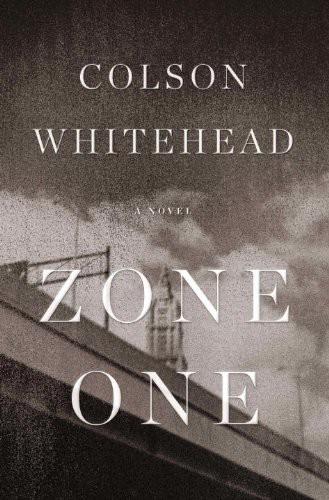
Zone One
A Novel
کتاب های مرتبط
- اطلاعات
- نقد و بررسی
- دیدگاه کاربران
نقد و بررسی

Starred review from June 20, 2011
While the revolution will not be televised, the apocalypse and what comes after, at least according to Whitehead (Sag Harbor), will have sponsors. It will even have an anthem, the brilliantly self-referential "Stop! Can You Hear the Eagle Roar?" (theme from Reconstruction). As we follow New Yorker and perpetual B-student "Mark Spitz" over three harrowing days, Whitehead dumpster dives genre tropes, using what he wants and leaving the rest to rot, turning what could have been another zombie-pocalypse gore-fest into the kind of smart, funny, pop cultureâfilled tale that would make George Romero proud. While many stories in this genre are set in a devastated nowheresville, Whitehead plants his narrative firmly in New York City, penning a love letter to a Manhattan still recognizable after the event referred to only as "Last Night." Far from the solemn affair so often imagined, the apocalypse in Whitehead's hands is filled with the kind of dark humor one imagines actual survivors adopting in order to stave off madness. The author sometimes lets the set pieces he's so good at run long, but otherwise succeeds brilliantly with a fresh take on survival, grief, 9/11, AIDS, global warming, nuclear holocaust, Katrina, Abu Ghraib, Pol Pot's Year Zero, Missouri tornadoes, and the many other disasters both natural and not that keep a stranglehold on our fears and dreams.

August 1, 2011
The zombie genre provides unlikely inspiration for the author's creative renewal.
Whitehead (Sag Harbor, 2009, etc.) never writes the same book twice, though his eclectic output had fallen short of the promise he flashed in his early novels (The Intuitionist, 1998, etc.). Yet here he sinks his teeth into a popular format and emerges with a literary feast, producing his most compulsively readable work to date. Though there's enough chomp-and-spurt gorefest to satiate fans of the format, Whitehead transforms the zombie novel into an allegory of contemporary Manhattan (and, by extension, America), where "it was the business of the plague to reveal our family members, friends, and neighbors as the creatures they had always been" and the never-explained apocalypse "sentenced you to observe the world through the sad aperture of the dead, suffer the gross parody of your existence." The reader's guide through this particular circle of hell is a clean-up/extermination operative called Mark Spitz (for reasons that aren't worth the elaborate explanation the novel eventually gives). He was formerly employed as a social-network functionary for a Starbucks-style coffee chain, an occupation that seems even more ludicrous in the wake of a society transformed by hordes of organ-eating zombies. (A colleague's former occupation was "a sommelier at a high-end eatery in Cambridge that specialized in offal.") With its savage sense of humor and thematic ambitions, the narrative is to contemporary zombie novels what the movies of George Romero are to other zombie flicks. As survivors of the "Last Night" struggle through "PASD, or Post-Apocalyptic Stress Disorder," the government (located in Buffalo) peddles hope in the form of its "American Phoenix Rising" campaign, with its own power-ballad anthem: "Stop! Can You Hear the Eagle Roar? (Theme from Reconstruction)." When the protagonist was a child, he asked his father the meaning of the word "apocalypse." His father replied, "It means that in the future, things will be even worse than they are now." And, sure enough, they are.
The latest from a generation of literary novelists who are erasing the distinction between art and pulp.
(COPYRIGHT (2011) KIRKUS REVIEWS/NIELSEN BUSINESS MEDIA, INC. ALL RIGHTS RESERVED.)

May 15, 2011
Zut! MacArthur fellow Whitehead (Sag Harbor) now gives us his take on the zombie phenomenon. Postapocalypse, with the world divided between the infected and the uninfected, the provisional U.S. government is trying to take back Manhattan--starting with Zone One, just south of LJ's offices. Part of the civilian help, Mark Spitz recalls the past while dealing with Post-Apocalyptic Stress Disorder. Then the undead start to rise. I'm not into zombies, but I'll read anything Whitehead writes. With a 12-city tour.
Copyright 2011 Library Journal, LLC Used with permission.

Starred review from August 1, 2011
As different in focus and approach as each of Whitehead's novels are, from The Intuitionist (1998) to Sag Harbor (2009), all percolate with his brilliant wordplay and arresting metaphors, stinging humor and fluency in pop culture. In this jump-in-with-both-feet zombie apocalypse tale, which owes much to master zombie filmmaker George Romero, Whitehead's dark lyricism works in chilling contrast to the macabre plot and doomsday comedy. A zombifying plague has ravaged the land. New York City has been sealed off, the marines have eradicated the pustulant hordes, and now, as part of the much-diminished government's propagandistic American Phoenix project, sweepers are eliminating the stragglers, lone, inexplicably bewitched zombies unable to leave their old haunts. Our guide through this ravaged world is sweeper Mark Spitz (he earns his ironic alias under harrowing circumstances), a self-identified paragon of mediocrity who possesses a surprising knack for apocalypse, which is actually a proclivity for compassion. This diabolically smart, covertly sensitive, ruminative, and witty zombie nightmare prods us to think about how we dehumanize others, how society tramples and consumes individuals, how flimsy our notions of law and order are, and how easily deluded and profoundly vulnerable humankind is. A deft, wily, and unnerving blend of pulse-elevating action and sniper-precise satire. HIGH-DEMAND BACKSTORY: Prominent and controversial author Whitehead will tour the country and do major media appearances for what is sure to be an avidly dissected venture into the horror genre.(Reprinted with permission of Booklist, copyright 2011, American Library Association.)

























دیدگاه کاربران